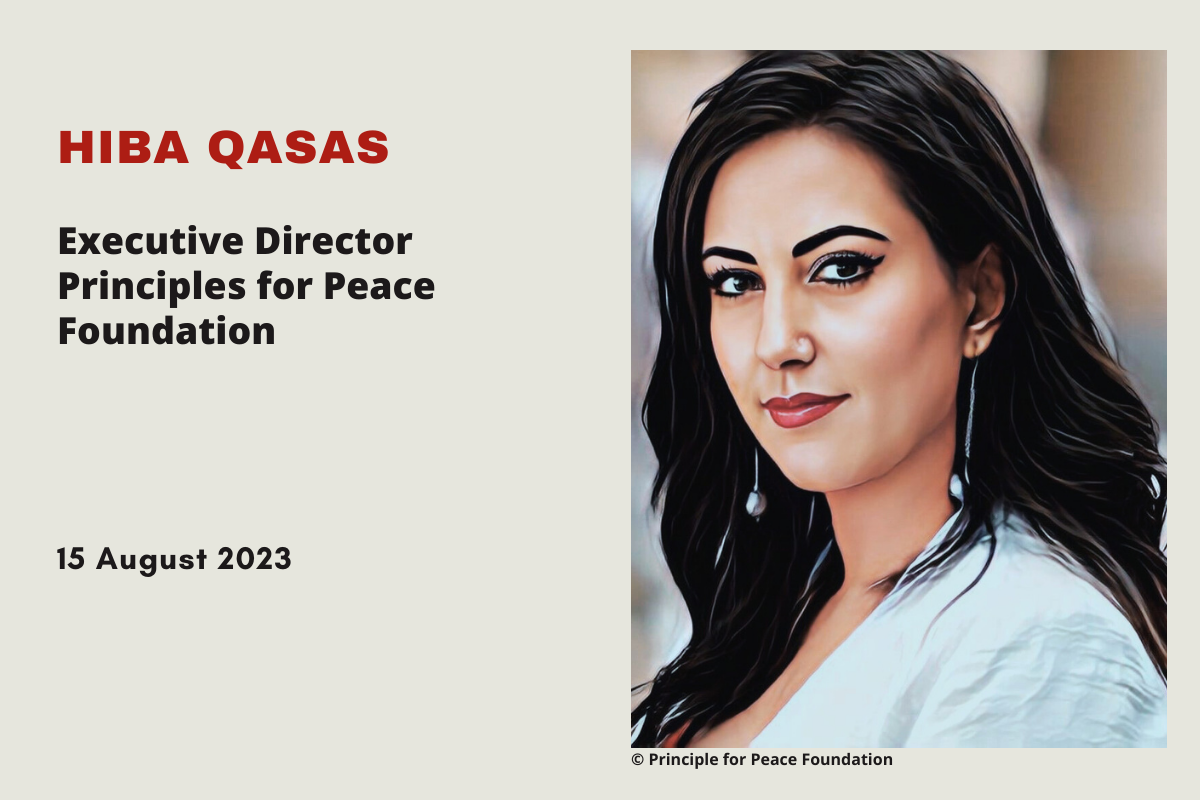The interview | Hiba Qasas
 |
How would you present your organization in a few words? What entails your position? What is your goal? |
Principles for Peace (P4P) Foundation is an independent and pioneering global organization. We are catalysts of change in the intricate and non-linear web of peacebuilding. We act as the bridge between diplomacy's polished floors and the rugged terrains of real societies, between data-rich studies and the decisions that impact communities. Independent yet deeply interconnected, we weave the expertise of over 120 organizations, from grassroots movements to high-level diplomacy, into a potent force for good. The Principles for Peace are our compass—providing a common lexicon, a diagnostic tool, and an accountability measure.
As the Executive Director of Principles for Peace, I genuinely see my position not as a title but as a service to our mission, values, and diverse global family. Our shared "Gameplan" doesn't just guide me; it humbles me. It is a constant reminder that my role is not just to lead, but to listen, to empathize, and to work in harmony with our community.
My roots are in a place scarred by conflict, and while I now find solace in the tranquil embrace of Switzerland, the echoes from my homeland never fade. Those voices, especially of the silenced and forgotten, are the compass for my journey. They remind me daily that the path to peace should resonate with the collective chorus, especially from those on the fringes. It's my heartfelt duty, and indeed a personal calling, to ensure that our strategies give voice to the aspirations and dreams of all, particularly those who've been sidelined in the past.
Our primary goal is to create an environment where peace engagement results in lasting positive change, accountable security, and legitimacy, measurable in the well-being and prosperity of the societies we serve. Our focus is to bolster the entire peacebuilding field, laying the groundwork for resilient and enduring peace processes. Understanding that peace isn't the effort of a few but a collective endeavor, our approach is rooted in forging partnerships and rallying a vast coalition.
 |
Among the concentration of actors in Geneva (IOs, NGOs, permanent missions, academia, and the private sector), who do you work with and how? |
At the Principles for Peace Foundation, we champion a global, multi-stakeholder approach that spans high-level diplomacy to grassroots levels. Our vision stems from an ecosystem perspective, recognizing conflict as an intricate interplay of socio-economic, political, and environmental factors rather than merely isolated events.
Such an understanding propels us to cultivate genuine partnerships. Our endeavors are more than stand-alone efforts; they embody a collective drive to enhance peace engagements across the globe. Our robust Stakeholder Platform, which consists of 120 organizations and a research committee, collaborates closely with us. This collaboration is further augmented by our intimate ties with the International Commission on Inclusive Peace (ICIP).
Over time, our diligence has cultivated one of the most impactful coalitions and consultative ventures. From East to West, North to South, our interactions encapsulate a broad spectrum of voices, from state to non-state actors, grassroots communities to UN entities, and global policymakers. The depth of our outreach is anchored in our formidable partnerships, prominently in Geneva and internationally.
Together with the International Commission on Inclusive Peace and our partners, we have spearheaded expansive participatory efforts in the peace sector. We've coordinated over 150 consultations, engaging stakeholders from 61 countries, and gleaned insights from an impressive collection of over 700 research documents and feedback from more than 100,000 contributors. Our approach adeptly interweaves diplomacy, politics, security, and on-the-ground realities.
Our synergy with the Maison de la Paix and its member institutions—such as Interpeace, DCAF, GCSP, Graduate Institute-CCDP—and our wider engagements in Geneva with entities like UNDP and Permanent Missions have been invaluable. Our expansive global network has made crucial consultations possible, linking regions from Southeast Asia to Latin America, Africa, and the Middle East.
Our gratitude extends to Germany, Denmark, and the Robert Bosch Foundation. Their steadfast support with the backing from the Canton of Geneva - that enabled our strategic location at Maison de la Paix - has exponentially broadened our reach and fortified our network.
 |
What are the strengths and weaknesses of Geneva with regards to the development of your activity? |
Geneva stands out as a unique nexus for international dialogue and action, especially in the realms of humanitarianism, human rights, and peacebuilding. This city's strengths have been instrumental in shaping the trajectory of the Principles for Peace Foundation. I will highlight three key features that I appreciate most:
- Hub for Collaboration: The concentration of numerous humanitarian, human rights, and peacebuilding organizations in Geneva creates a fertile ground for collaboration and joint action. This confluence of key stakeholders and experts facilitates a synergy that is hard to replicate elsewhere.
- Swiss Tradition of Peace: Switzerland's rich tradition as peacemakers and in norm setting has added gravitas to our initiatives. Given that Geneva is the birthplace of the famed Geneva Conventions and a bastion of humanitarian principles, it's only fitting that our Principles for Peace found their genesis here. This environment steeped in a commitment to peace and humanitarian values has been pivotal for our foundation's ethos and evolution.
- Neutrality & Global Engagement: Switzerland's long-standing tradition of neutrality has granted us a unique platform. From Geneva, we've been able to engage with a broad spectrum of stakeholders, from East to West, North to South. This neutrality, combined with Geneva's proximity to conflict and post-conflict regions and Switzerland's positive reputation as a mediator, has augmented our global outreach and effectiveness.
While these strengths have significantly empowered our efforts, Geneva, like any hub, has its limitations. It can sometimes be viewed as an "echo chamber," where similar perspectives converge and reinforce each other. We constantly strive to expand our horizons, ensuring we remain attuned to diverse voices and realities outside this diplomatic enclave.
However, our journey in Geneva has undeniably laid a strong foundation for our mission. We take immense pride that Geneva served as the cradle for our collective endeavor. As we expand our presence to other intergovernmental hubs and New York, we are witnessing the ripple effects of our Geneva-incubated vision. A recent testament to our impact was the recognition of the Principles for Peace during the United Nations Security Council High-Level Open Debate in May 2023 as an important frame of reference for peacebuilding. This acknowledgment underscores the power, and potential of initiatives birthed in the dynamic ecosystem of Geneva.
 |
What do you think global governance should look like 20 or 30 years from now? |
In 20 to 30 years, global governance should adeptly evolve to address the ever-growing intricacies of the peace and security landscape. As we witness the ascent of transactionalism, coupled with the gradual decline of multilateralism and credibility challenges among various actors, it's evident that our traditional toolboxes are falling short. This necessitates a pivotal shift in our governance paradigms.
The linchpin of future governance must be a renewed partnership ethos, characterized by humility, reciprocity, and shared values. It's crucial not only to safeguard but also to dynamically enhance our established institutions. This becomes especially pressing when we consider the mounting polarization, widening geopolitical divides, immense climate risks, and the increasingly intricate international tapestry. Our multilateral frameworks, tested by growing geopolitical strains, urgently call for innovative and new mechanisms. Current strategies, although pivotal in their time, are revealing their constraints in our evolving context.
Ultimately, global governance of the future should stand as a platform for genuine multi-stakeholder cooperation, endorsing policies rooted in inclusivity, adaptability, and empirical evidence.
 |
What question would you like to have been asked? And what keeps you “awake at night”? |
While I'm naturally a deep sleeper, there are heavy concerns that occasionally puncture my peace at night. I'm deeply troubled by the growing cynicism around peace and the creeping shadows of hopelessness in our global dialogue. The specter of complacency, particularly in contexts and among groups where persistent commitment is vital, often preoccupies my thoughts. However, what resonates most profoundly with me is the connection I feel to the 1.7 billion people enduring conflict. Being once part of such a community, I'm intimately familiar with the aspirations, fears, and hopes that punctuate their daily lives. In my current role, the awareness of their reality and the desire to make even a small positive difference for them is a humbling weight — and it's this immense sense of duty that sometimes keeps me awake at night.
